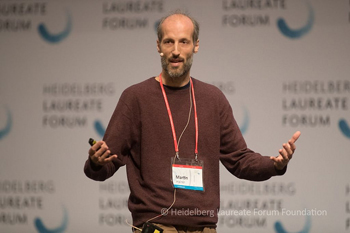Maths in a minute: The two envelopes problem

Martin Hairer talking at the Heidelberg Laureate Forum 2017. Foto: Bernhard Kreutzer for HLFF (c) Pressefoto Kreutzer
Plus is currently in Heidelberg, Germany, visiting the Heidelberg Laureate Forum 2017. The Forum gives young researchers in maths and computer science the chance to meet some of the best minds in their fields — and it gives us the opportunity to meet and interview both the laureates and the next generation. We'll be bringing you some in-depth coverage soon, but in the meantime we leave you with a brain teaser we learnt from Fields medallist Martin Hairer yesterday.
Imagine you have two envelopes. They both contain money, one twice as much as the other. You can pick one and keep the money inside. But just before you open your chosen envelope you are given the chance to change your mind. What should you do?
Write  for the amount that's in your chosen envelope. This means that the amount of money in the other envelope is either
for the amount that's in your chosen envelope. This means that the amount of money in the other envelope is either  or
or  . The probability that it's
. The probability that it's  is
is  and so is the probability that it's
and so is the probability that it's  . So the expected amount you'll get is
. So the expected amount you'll get is
![\[ \frac{1}{2}\left(2x+\frac{x}{2}\right) =x+\frac{x}{4} = \frac{5x}{4}. \]](/MI/906b4e1be841d77cdaee2e99e30966dc/images/img-0001.png) |
Since that’s bigger than  , you should swap envelopes. But what if you are given another chance to swap envelopes after you have changed your mind once? By the same reasoning as above you should swap back again. And then, by the same argument again, you should swap a third time, and so on, forever. You end up in an infinite loop of swapping and never get any money at all. Is there something wrong with the reasoning? If yes, then what? Post your thoughts as a comment below!
, you should swap envelopes. But what if you are given another chance to swap envelopes after you have changed your mind once? By the same reasoning as above you should swap back again. And then, by the same argument again, you should swap a third time, and so on, forever. You end up in an infinite loop of swapping and never get any money at all. Is there something wrong with the reasoning? If yes, then what? Post your thoughts as a comment below!